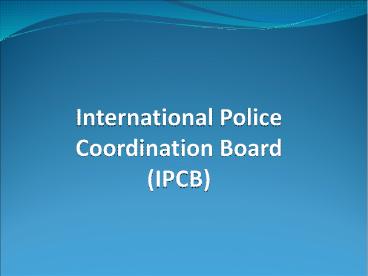International Police Coordination Board (IPCB) - PowerPoint PPT Presentation
Title:
International Police Coordination Board (IPCB)
Description:
IPCB - Way Forward IPCB - Way Forward * Board level is chaired by the Minister of Interior, it is held quarterly Caucus is chaired by the HoM EUPOL and is organized ... – PowerPoint PPT presentation
Number of Views:138
Avg rating:3.0/5.0
Title: International Police Coordination Board (IPCB)
1
International Police Coordination Board (IPCB)
2
Mandate
- Dubai Conference 2006
- IPCB is the main coordination body for
institutional and police reform within the wider
context of rule of law - IPCB directs, prioritizes and coordinates the
international effort
3
Objective
- To ensure a coherent and coordinated approach
amongst the international community and provide
support to the Afghan MoI in the development of
policies, strategy, and plans in the area of
institutional and police reform
4
Members
5
Structure
Secretariat
6
Wider Decision-Making Process
Security Standing Committee
IPCB
Joint Coordination Monitoring Board (JCMB)
Minister of Interior (Chair) 19 IC members MoI
Minister of Defence / UNAMA (co-Chair) Approximat
ely 30 IC members
Minister of Finance / UNAMA (co-Chair)
Governance Standing Committee
Socio-Economic Standing Committee
7
IPCB Secretariat
- Role of the IPCB Secretariat is to guide,
facilitate and coordinate the activities of the
IPCB and its associated bodies - Permanent body (civilian police personnel)
- Provides recommendations to, and receives
direction from, IPCB - Facilitates meetings and working groups
- Manages Police Reform Database
- Provides specialist input to key MoI/ANP
documents
8
IPCB Secretariat Staff
9
IPCB Subordinate WGs
- Institution Reform
- Senior Police Advisory Group (SPAG)
- Police Assessment WG (PAWG)
10
Senior Police Advisory Group
- Composed of senior police from IPCB members
- Meets regularly and upon tasking by the IPCB
- Provides police expertise to IPCB bodies and
other organisations - Sub-Working Group Police Assessment Working
Group - Response to IPCB/SSC UNAMA ANP growth approval of
157.000 conditional upon development of
assessment tool for civilian policing skills - Expected feedback February 2012
11
Strategic Level Context
12
Lines of Effort/Plan of Action
13
Key Questions
14
Road Map for Board (Chicago)
IPCB BOARD/JCMB/CHICAGO SUMMIT
15
IPCB RoL Mandate
- Work across agencies and IC to promote transition
to RoL and Civilian Policing - Improve linkages and transparency between police
and justice sector reform - Encourage transition to evidence-based judicial
process - Track transition of Central Prison Directorate to
the MoI
16
Key MoI Reform Initiatives
- National Police Plan (NPP)/National Police
Strategy (NPS) - Ministerial Development Plans (MDPs)
- Institutional Police and Policy Development
- Institutional Reform Working Group
- Senior Police Advisory Group
- Police Assessment Working Group
- MoI Legal Review Working Group
17
Challenges to RoL Transition
- Illiteracy
- Corruption
- Militarization of Police
- Attrition
- Gender Human Rights
- Police/Prosecutor Relations
- Afghan Law v. Sharia/Tribal Custom
18
Police Reform Database
- Operational since Jan 2011
- Administrated by IPCB Sec
- Simple tool to share unclassified information
- Virtual on-line place/tool for information
sharing - Prevents duplication of efforts and avoids gaps
in - joint coordination activities
- Preserves institutional memory
- Provides overview of intl. contribution with
regards to police trainings, projects and overall
police reform
19
Police Reform Database
20
Police Reform Database
21
Police Reform Database
22
Police Reform Database
23
Police Reform Database
- Who is responsible for populating/updating the
database? - Over 100 analysts from various organizations/natio
ns predominantly IPCB members (EUPOL, NTM-A,
UNDP, GPPT, US, France, etc.) - What information does the database contain?
- Contributing countries and organizations, facts
and figures, interactive map, search engine,
gallery, library, address book, police trainings,
projects, etc
24
Police Reform Database
- How do I gain access to it?
- Send request to one of the admin officers who
will create an account for you and provide
training - zoran.mamuzic_at_ipcb-afg.eu
- ray.nash_at_ipcb-afg.eu
- mark.whittifield.can_at_afghan.swa.army.mil
25
(No Transcript)
26
(No Transcript)
27
QUESTIONS?
www.IPCBafghanistan.com































